Essay by Deric Pamp
Life – October 2006 – Colorado Central Magazine
OUR FAMILY INCLUDES an aging Golden Retriever, a smart and loving female named Bonnie. She is 12 years old now. She has thyroid trouble and arthritis, and last year diabetes took her sight before we could get it regulated with insulin. Even so, she is cheery, and we think it’s entirely fair that we take care of her now and act as her seeing-eye persons. After all, she protected us from prairie dogs, marmots, and rabbits for all those years, so it’s our turn.
Bonnie is getting on in years but she is still the fierce, indomitable personality she has always been. I am especially impressed with how gracefully she has made the adjustment to age, infirmity, and even blindness. She has figured out the easiest ways to get around the house. She knows where the dog door is, and we have placed chairs on our low deck to help her find the stairs down to the yard. She has learned where the bushes and retaining walls are out there, too, so she can go in and out without any assistance.
She is still the ranking canine in our pack, her authority unquestioned by Samantha the Aussie and Roxanne the Coton. She happily and gently wrestles with Roxie, lying down so the smaller dog has a fair chance to jump on her head. Rather than let it ruin her life, Bonnie has accepted her blindness with dignity and aplomb — and she never was much of a reader.
Our regular morning walk, ever since she went blind, is on a wide pathway that follows a raised berm around the old skeet range on County Road 160. Bonnie can walk and even canter off the leash because there is nothing to bump into and the downslope on the sides of the berm warn her when she is getting off the path. She has the best nose in our pack so when there’s a goodie like a dead squirrel in the open field, she leads the others to it.
One part of the circuit borders Franz Lake. Bonnie, being an aquatic creature like every Golden, never misses the chance to go for a swim. This means my Jeep is always dirty because it transports wet, sandy dogs every day, but she enjoys it so. She has taught Sam and Roxie, neither of them natural water dogs, that swimming is a proper canine privilege.
Today was a normal day, although cool and rainy. I walked along, listening to the raindrops on the hood of my jacket and the brim of my hat, figuring out what I was going to do at the office, damning Bush for his arrogant incompetence, the usual stuff. The dogs were with or behind me instead of ranging ahead, because the things that needed sniffing were especially aromatic in the dampness.
WHEN WE GOT TO THE POND I turned right. I glanced back over my shoulder to make sure Bonnie was making the turn, but I could not see her. I kept turning clockwise. When I spotted her, she was thirty yards out in the pond and swimming strongly after a dozen ducks who paddled ahead of her, quacking mildly. She could not see them but she could smell them, so she forged ahead, her rhythm good, her breathing strong. I called to her and she reluctantly turned and came back. She got out of the pond, shook mightily, and then trotted happily toward my voice, a smile on her white face.
I turned 60 this year. I have a bad knee, a bad shoulder and two bad ankles, souvenirs from a life of active and enthusiastic klutziness. My bald spot is pronounced and expanding, arthritis bites me in both thumbs, and my bifocals seem to be telling me I need trifocals. I have known since 1970, when I chose not to get on a helicopter that was shot down shortly after it took off from my fire base, that every day was a gift, but as I age and the things I like to do become more difficult, I wondered how to deal with this process.
Now I know, because Bonnie taught me: don’t sweat the small stuff, adapt to the changes, smile, and keep on swimming after ducks.
Deric Pamp is a Salida attorney and consultant for non-profit organizations.


